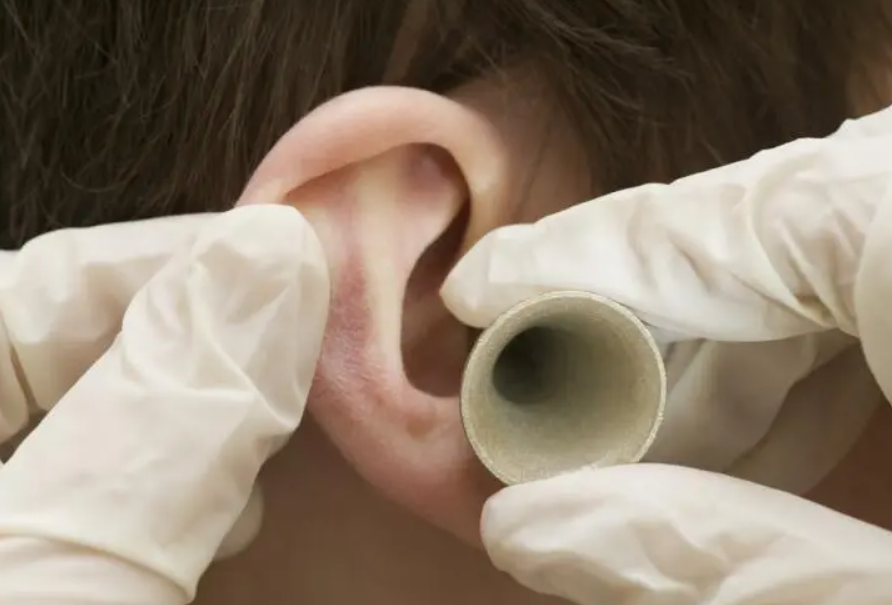
Acoustic neuroma is a benign tumor that grows on the auditory nerve between the ear and the brain. As the tumor grows and presses on important surrounding structures, it can lead to ipsilateral hearing loss, which can be accompanied by tinnitus or vertigo.
The symptoms are easily confused with sudden deafness, and a complete MRI of the ear is needed to confirm the diagnosis.
Otoliths and Meniere's disease, which are the most common diseases that cause vertigo in otolarinology, may present complex clinical symptoms when sudden deafness is combined with these two diseases, leading to difficulties in identification.
Otoliths, also known as benign paroxysmal positional vertigo, is characterized by a brief rotation of vision and is associated with a change in head position, usually occurring when turning over, getting up, or lowering the head. Position test is the "gold standard" for the diagnosis of otoliths, and reduction treatment is the most effective treatment.
The symptoms of Meniere's disease are recurrent episodes of vertigo accompanied by fluctuating hearing loss, "fluctuating" meaning that hearing decreases during episodes of the disease and can be partially or completely restored during intervals.
For patients with sudden deafness combined with vertigo symptoms, doctors usually have to rule out the above diseases before making a diagnosis.
Treatment effect decreased significantly after 7 days of onset
In daily life, once you feel a sudden decline in hearing, you should seek medical attention as soon as possible to screen for the cause. The condition of sudden deafness is not irreversible, it is possible to cure, and the curative effect is closely related to the time of treatment, the age of onset, the degree of hearing loss and other factors.
About the treatment of sudden deafness "time window", the medical community has different opinions. The more consistent view is that the earlier the intervention, the better the outcome. Most studies believe that the effective rate of treatment decreases significantly when the start time of treatment is > 7 days after the onset of disease.
We have encountered some patients due to work abroad, epidemic and other reasons, only six months after the onset of the disease to seek help, after active salvage treatment, hearing recovery is limited.
However, even if the treatment effect is best within a week, due to the existence of individual differences, it does not mean that more than this time is completely useless, it is still recommended that everyone actively treat.
Generally speaking, after the patient visits, the following examination items need to be improved.
Ear examination: The purpose is to rule out otitis media, tympanic membrane perforation and other ear diseases that may lead to hearing loss; Hearing tests: Determine the extent and type of hearing loss; Imaging examination: mainly internal auditory tract magnetic resonance or craniocerebral CT examination to exclude acoustic neuroma and craniocerebral lesions; If the patient also has discomfort such as vertigo, a postural test and vestibular function examination are performed to rule out otoliths and Meniere's disease.
Hormone therapy is preferred
Clinically, there are many commonly used treatment methods for sudden deafness, and drug therapy is the first choice.
Hormone therapy: Glucocorticoids have been internationally recognized as first-line drugs for the treatment of sudden deafness and can be administered orally, by intravenous infusion or by tympanical injection.
However, the use of hormones in people with diabetes can lead to elevated blood sugar, which should be closely monitored and controlled during treatment.
Nutritional nerve drug treatment: Kinado (Ginkgo biloba extract injection), mecobalamine, neurotrophic factor, antioxidants and other drugs, mainly used in the brain, peripheral nerve blood supply disorders, has the effect of improving blood microcirculation and nutritional nerve.
In addition, hemorheology therapy and hyperbaric oxygen therapy are performed.
Hemorheology treatment for some patients with sudden deafness accompanied by inner ear vascular disease (vasospasm or thrombosis), batroxase this drug has the effect of inhibiting thrombus formation and dissolving thrombus, but in the process of application may have the risk of bleeding, so the coagulation function needs to be monitored.
Hyperbaric oxygen therapy usually needs to be combined with other treatments, and hyperbaric oxygen therapy has its own strict indications and contraindications, and needs to be evaluated by a professional before starting treatment.
During the treatment process, if the hearing is completely recovered, the drug can be considered to stop, and the treatment time can be appropriately extended for those with poor results.
For those who are not satisfied with the final treatment effect, hearing AIDS or cochlear implants can be selected according to the degree of hearing loss.
Overall, the earlier the start of treatment, the younger the age of onset, and the milder the degree of deafness, the better the prognosis.
Sometimes, sudden deafness is only one of the clinical manifestations of many systemic diseases, and the treatment of deafness alone may treat the symptoms rather than the root cause, and it is also necessary to pay attention to changing the bad lifestyle, maintaining a relaxed mood, and standardized management of diseases such as hypertension and diabetes.

